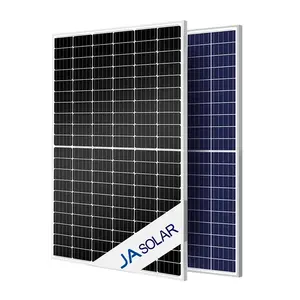
High Efficiency JA Solar Panel With Cheap Price 550W With 25 Years Warranty Rooftop Photovoltaic Panels Solar Module














Marine solar panels are a cornerstone for sustainable energy solutions on watercraft. These panels harness solar energy to power various onboard systems, making them an essential component for solar panels for boats and yacht solar panels. With advancements in technology, these panels are designed to meet the unique demands of the marine environment.
The application of marine solar energy is diverse, ranging from solar power for boats to solar power for yachts. Users can choose from monocrystalline, polycrystalline, or thin-film solar cells, each offering different benefits. Monocrystalline panels are known for their efficiency and are ideal for those with limited space, while polycrystalline and thin-film options offer flexibility and portability, perfect for solar panels for sailboats.
Marine solar panels are built to withstand the harsh marine environment. They come in various forms, including glass-free and flexible options like flexible solar panels marine, which cater to the dynamic needs of vessels such as sailboats and yachts. The materials used are corrosion-resistant and are capable of enduring saltwater exposure, ensuring longevity and consistent performance.
The advantages of integrating marine solar charger systems are manifold. They provide a reliable source of power, essential for maintaining critical systems on board. Moreover, solar power reduces the reliance on fuel-powered generators, thereby minimizing environmental impact and operational costs. For those seeking an eco-friendly power source, solar power boat charger systems are an excellent choice.
When selecting a marine solar panel, it is crucial to consider the wattage rating and size to ensure it meets the energy requirements of the vessel. Panels with higher wattage capacities are capable of powering more extensive systems, suitable for commercial and residential marine settings. Additionally, the lifespan of these panels is a critical factor, with many designed to provide upwards of 25 years of service.
Marine solar panels contribute significantly to reducing the carbon footprint of marine vessels. The efficiency of these panels has seen continuous improvement, making them a viable option for those looking to adopt marine solar solutions. They not only offer an energy-efficient alternative but also support the global move towards environmental sustainability.